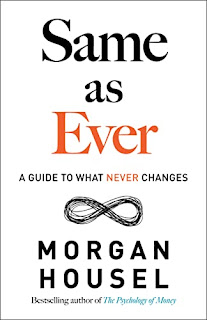Same as Ever – Morgan Housel – Review
As I was reading through Morgan’s 'Same as Ever' book, it reminded me of the great tamil philosopher Thiruvalluvar’s 1330 verses that remains true till date having withstood over two millenniums of human civilization and progress. Though Morgan’s score of tiny stories doesn’t cover the depth of human emotions as it does with Thirukural, the fundamental idea remains the same.
There are infinite number of ways that your life could
potentially play out while any individual seems to be living just a single
version of it. The leading question is what would be true in every imaginable
version of your life, the universal truth that transcends beyond luck or chance.
Having said that, let’s look at chance event that occurred on
28th of August 1776, the battle of long island which marks itself as
a significant day in the history of America. George Washington’s 10,000 troop
army was battered by British through it’s fleet of 400 war ships. All that
British army had to do was to sail up the east river and wipe out the cornered
troop of Washington, it meant that the country called America would have been non-existent
in the current age, something that few of us could even imagine. However, heavy
winds blowing in the wrong direction meant the ships could never sail across
the east river thereby saving a great nation when it was in nascent stage.
Every event creates it’s own bunch of offsprings which
impacts the world in unimaginable fashion. Placing ourselves as experts in the
middle of 18th century, if we were to predict who would have
conquered North America then Great Britain would have been overwhelming favourites.
Two centuries later our predictions are nothing less than absurd just due to a
chance event of wind blowing in the opposite direction. So, what do we learn? An
unforeseen event can change the course of history.
The case of world famous illusionist Harry Houdini offers an interesting take on the lethal impact of a strike when you least expect it. A glance at the picture is enough to state his mystical powers of escaping himself after such an arduous range of chain restricting him from all possible movements along with a handcuff as well. However, Houdini manages to break open the numerous locks to free himself up within hours maybe even minutes.
One of his flagship act during stage performance is to
request strongest men amongst the crowd to punch him on his stomach. Over a
period of many years of stage performance, scores of men volunteered to punch a
heavy blow and hope Houdini to back down but none could even bring in a flinch
on his face. On 22nd October 1926, he invited McGill students to
visit him in the dressing room and during the course of discussion when Houdini
was plopped down on a couch, a student named Whitehead enquired if he could
take any number of hard punches on his abdomen. When he responded in an
affirmative fashion, Whitehead delivered 4 to 5 well directed punches at a point
Houdini least expected it. As a result, Houdini passed away on 31st
October 1926 due to ruptured appendix. A strike when one least expects can be
lethal even to the strongest while the blow can be provided by an opponent whom we
presume as weak.
On another aspect, who do you think captures our attention? A pathbreaking scientist who delivers a monotone explanation of causality and throws up a long list of supporting statistic or does Martin Luther King's I have a dream speech still resonate on your ears? The answer is obvious and the lesson is that one who can narrate outstanding stories wins the pitch.
I have called out a couple of interesting stories from the
book while there are scores of them in Morgan’s book titled ‘Same as Ever’.
Every structured narrative worth it’s salt offers interesting perspectives and so
does the mentioned book as well.
Recommended and can be a breezy weekend read!



Comments